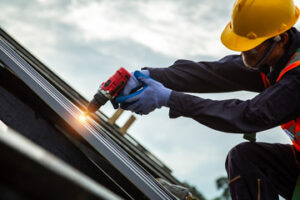Roofers Brigantine NJ install and repair roofs on single-family homes. These roofs can have a variety of materials, designs, and styles. Asphalt shingles are the most popular option because they’re affordable and versatile, but tile roofs offer an attractive, durable alternative.

A home’s roofing structure consists of rafters or trusses and sheathing, usually made from plywood or oriented strand board (OSB). The underlayment protects the roof decking and helps regulate indoor temperatures.
Residential roofers install, repair, and replace pitched and flat roofing systems for homeowners. They use a range of materials, including asphalt shingles, tar, plywood, and EPDM membrane. They also offer solutions for keeping homes cool, such as installing soffit vents on steep-sloped roofs. They also conduct roofing inspections to spot and address potential problems before they escalate.
Licensing requirements vary between states, but most require a state contractor’s license to practice in the construction trades. A licensed roofer must complete an apprenticeship to learn the skills of the trade and pass a rigorous exam to earn their license. It’s best to hire a licensed roofer because it ensures that they have the proper knowledge and expertise to complete your roofing project safely and effectively.
Licensed residential roofers are required to carry insurance that covers them in the event of an accident or damage while working on your roof. They should also have a clean business record and be able to provide proof of workman’s compensation and general liability insurance. If you’re unsure of their licensing status, contact your state’s regulatory agency to find out more information.
When choosing a residential roofer, it’s important to ask for references from past clients. These references can help you gauge the quality of their workmanship, adherence to timelines, and professionalism. Also, check online reviews to see what previous customers have said about their experience working with the roofer.
A qualified roofing company should be able to provide you with a detailed quote for your roof project, including materials, labor, and cleanup costs. Compare quotes from several different roofers to make sure you’re getting a fair price and comprehensive services. Be wary of any quotes that are significantly lower than the rest, as this could indicate subpar materials or workmanship. Also, be sure to choose a roofing contractor with a good track record and extensive experience in the type of roof you have or want on your home. This will ensure that your new roof is built to last and withstand the elements. This will also protect your investment and help you avoid costly repairs down the road.
Roof Repair
Roof repair services are offered by residential roofers to fix problems like leaks or loose shingles. They can also add insulation to help lower energy costs and keep the home warmer in the winter. In addition, they can repair gutter systems and install siding to make the exterior of the house look better.
Roofers with a focus on service usually work in the insurance industry and offer roofing solutions for homeowners who have had damage from severe weather conditions. They are more likely to offer low or no-interest financing and may be able to work with you to file an insurance claim. These contractors are a great choice for people who have been through a major storm that has caused significant damage to their home and are looking for a quick and easy solution.
Residential roofers can also do regular maintenance to prevent problems from occurring in the future, including inspections and cleaning. These services can also save money by preventing the need for major repairs or replacements in the future.
These services are typically more affordable than a full roof replacement and can be completed in a fraction of the time. These roofers often have access to a wide range of materials, so they can find a price point that fits your budget. They may have a sales team that is knowledgeable about different types of materials and can help you choose the best option for your home.
Roof repairs are essential to the overall condition of your home. Leaks or other problems in the roof can cause rot or mold within your home, so it’s important to have these issues addressed as quickly as possible. Depending on the severity of the issue, you may need to hire a professional roofing contractor or you can perform the repairs yourself using a roof repair kit. A residential roofing contractor will be able to identify the problem and repair it quickly so you don’t have to worry about additional damages to your home. They can also inspect other parts of your home to ensure that there are no problems with the foundation, walls, or ceilings.
Roof Replacement
Residential roofers offer services related to roofing installation, repair and replacement. These professionals work on single-family homes and multi-unit housing complexes. They use ladders and scaffolding to access rooftops, working carefully to ensure the structure is safe and secure. They also communicate with homeowners, discussing the project details and addressing any concerns. Some roofers specialize in installing various types of roofing materials, including asphalt shingles, wood shakes and tile shingles. Others may focus on flat roofing systems, rubberized and EPDM roofing materials or hot and cold roof applications.
In addition to offering a full range of roof replacement services, residential roofers can replace damaged siding and gutters. They can also install skylights and other roof accessories, such as metal vents, flashing, soffit and fascia. They are usually experienced in repairing wind, hail and snow damage to these components as well.
There are different kinds of roofing contractors, from specialized storm chasers to large corporate roofing companies. You need to choose the right one for your home, based on your needs and the type of roofing system you have. If you are replacing a roof after a severe storm, look for a roofer that specializes in insurance claims to streamline the process for you. They will know how to communicate with the insurance company and may be able to get you more money for your new roof.
It is also a good idea to find a contractor that has a permanent business location and is licensed. This shows that they are a legitimate, established roofing business and not just some guy in his garage working on his own house. These roofers often have a customer service department that is staffed to answer your questions, make appointments and provide quotes.
Before the roofers start their work, it is wise to talk to your neighbors and give them a heads up about the noise, disturbance and possibility of stray shingles or nails flying into their yard. This can help keep everyone on good terms and may even lead to them helping with the cleanup effort afterward.
Commercial Roofing
Residential roofers may see commercial roofing as an intriguing and challenging opportunity, but breaking into the market can also mean higher client expectations, different materials and new insurance requirements. Those factors can add up to a major change in business practices and the way a roofer is compensated for their work.
Commercial roofs can be flat or low-sloped, and they’re often much larger than residential roofs. They’re frequently used on warehouses, shopping malls, offices and other large buildings. The roofs can be made of a variety of materials, including asphalt shingles, wood shakes, metal panels and tile. A typical installation involves nailing plywood to wooden rafters to create the roof deck, and then laying down a layer of felt paper before installing the shingles or other material.
The roofs of some commercial structures need special coatings to protect the structure from leaking. Some of these coatings can include gravel, tar, TPO or EPDM. Commercial roofers with the necessary skills can install these systems to prevent leaks and other problems.
Another big difference between commercial and residential roofing is that commercial clients are usually very specific about what they want on their roofs. Skujins says he regularly works with engineering firms, roof consultants and property managers who demand that the commercial roofers they hire offer particular kinds of roofing systems within certain specifications and with a particular warranty.
It’s also important to note that a commercial roofer needs to be comfortable working on very high roofs. It’s common to see a crew of roofers ascending up ladders and walking around on the roof, especially during installation or repairs.
As a result, it’s important that the roofers have good balance and a strong core body to support them while they’re climbing and working on the high walls of a building or on the roof. In addition, commercial roofers need to have a high level of physical fitness to keep up with the work load and stay safe while on the job.
For some residential roofers, the transition to commercial work is an opportunity to get more lucrative jobs and increase their income. But for many others, it’s a risky move that could lead to slower growth or even bankruptcy.
